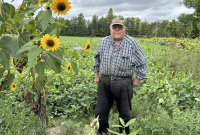Support strong Canadian climate journalism for 2025
By the time Ottawa paused applications, a program helping Indigenous communities join resource development was 80 per cent oversubscribed, according to a briefing note to Natural Resources Minister Jonathan Wilkinson obtained by Canada’s National Observer.
Applications for the Indigenous Natural Resource Partnership Program, designed to help Indigenous communities develop natural resource projects, paused in May “to ensure program integrity,” the documents, which Canada’s National Observer obtained through an access-of-information request, said.
Natural Resources Canada vastly underestimated demand for the program, which was allocated an $80-million budget in 2022. By March 2023, it had received proposals totalling $144 million, and another $13.1 million in proposals was expected.
According to Natural Resources Canada, priority for the program would be given to:
- Projects that benefit multiple Indigenous communities and/or organizations.
- Projects that support community capacity to transition to and participate in projects that help Canada reach its net-zero objectives through a shift to clean energy, including critical mineral development, renewable energy projects, nuclear, forestry and more.
Proposals for oil and gas, carbon capture and pipeline projects are also listed as possible focuses.

The federal government has tried to lessen Indigenous communities’ dependence on fossil fuels with programs such as the Indigenous Off-Diesel Initiative, which helps remote Indigenous communities move on from powering their community with diesel as an energy source.
Ottawa’s clean fuel fund program, which builds capacity to enter the market for biofuels and electrification, is similarly designed to help Indigenous communities and organizations overcome challenges that prevent access to the natural resources marketplace.
Now, during the Indigenous Natural Resources Program pause, Natural Resources Canada will decide how best to use the remaining $34 million in the program’s budget. The briefing note says Natural Resources Canada will fund proposals it determines will have the highest-quality impact while balancing regional priorities.
Budget 2022 also allocated at least $25 million to support Indigenous participation and capacity-building for Ottawa’s Critical Mineral Strategy, which is the roadmap to transition Canada’s energy and economy through an explosion of mining development.

There is currently $22.3 million worth of proposals that include critical minerals, with only $700,000 approved at the time of the pause.
According to the briefing note, during the pause, Natural Resources Canada will undergo a strategic analysis to determine how existing investments stack up against the program objectives.

The findings of the strategic analysis will inform other agencies on future program design and the investments needed to adequately support economic reconciliation, a term used by the department to define Indigenous participation in Canada’s natural resources industry.
Natural Resources Canada told Canada’s National Observer the strategic analysis remains ongoing.
Matteo Cimellaro / Canada’s National Observer / Local Journalism Initiative








Comments
Could not get the key item from this article, which is how many $ of their own money a recipient must raise in order to get $1 of federal assistance.
If it's basically free money, then I think I know why it is so popular.